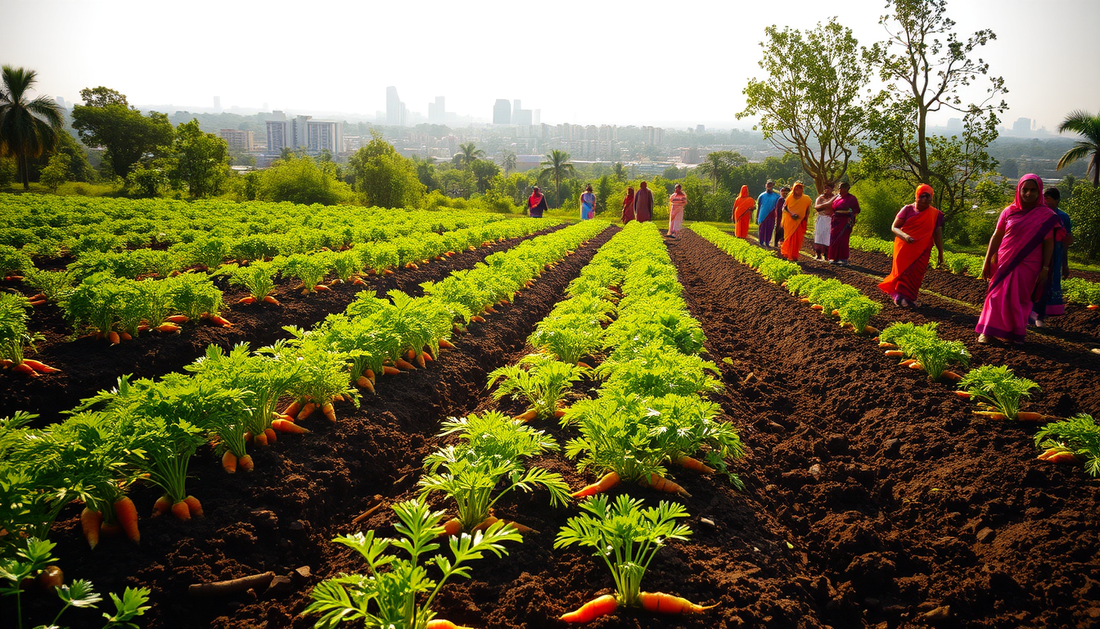
Unlocking the Secrets to Growing Delicious Carrots in Bangalore's Soil
Share
As the sun rises over the bustling city of Bangalore, gardeners and urban farmers alike are eager to uncover the secrets to cultivating the perfect carrot crop. In a city known for its vibrant culture and thriving tech industry, the desire to connect with nature and grow one's own food has never been stronger.
At Idyl, our mission is to empower Bangalore's green-thumbed enthusiasts with the knowledge and tools they need to flourish. Whether you're a seasoned gardener or a beginner just starting out, we're here to guide you through the process of growing carrots in Bangalore's unique soil conditions.
Understanding Bangalore's Soil
Bangalore's soil is often characterized by its red, lateritic composition, which can present some unique challenges for root vegetable cultivation. This soil type is typically acidic, with a pH range of 5.0 to 6.5, and can be low in organic matter and nutrients.
To ensure your carrot crop thrives, it's essential to properly prepare the soil. Begin by conducting a soil test to determine the exact pH and nutrient levels. This will help you tailor your soil amendments to create the ideal growing environment for your carrots.
Amending the Soil
One of the most important steps in preparing your carrot bed is to incorporate plenty of organic matter. This can be in the form of well-rotted compost, aged manure, or a combination of both. Aim to mix in at least 4-6 inches of organic matter to a depth of 8-10 inches. This will not only improve the soil's structure and drainage but also provide a steady supply of nutrients for your carrots.
If your soil test reveals a pH that is too low (acidic), you can add lime to raise the pH to the optimal range of 6.0 to 6.8. Conversely, if the soil is too alkaline, you can use sulfur or other acidifying agents to lower the pH.
Raised Beds and Containers
Another effective strategy for growing carrots in Bangalore is to utilize raised beds or containers. Raised beds allow you to create the perfect soil blend, ensuring optimal drainage and nutrient availability. They also help to protect your carrots from compaction and waterlogging, which can be common issues in Bangalore's heavy clay soils.
If space is limited, consider growing your carrots in containers or raised planters. This approach allows you to have complete control over the soil composition and can be especially useful for gardeners with limited outdoor space.
Timing and Planting
In Bangalore, the best time to plant carrots is during the cooler months, typically between October and February. This timing aligns with the region's ideal growing conditions, as carrots thrive in mild temperatures and moderate rainfall.
When planting, be sure to sow your carrot seeds about 1/2 inch deep and 1 inch apart. Thin the seedlings to 2-3 inches apart once they've germinated and established their first set of true leaves. This will give your carrots the space they need to develop their signature long, tapered roots.
Watering and Mulching
Consistent moisture is crucial for carrot growth, as they require a steady supply of water to develop their roots. Aim to keep the soil consistently moist, but avoid overwatering, which can lead to rot and disease.
Mulching your carrot bed with a 2-3 inch layer of organic material, such as straw, leaves, or shredded bark, can help retain soil moisture and suppress weed growth. Be sure to keep the mulch a few inches away from the base of the plants to prevent rot.
Caring for Your Carrots
As your carrots begin to grow, it's important to maintain a vigilant eye for any pests or diseases that may threaten their health. Some common challenges in Bangalore include carrot flies, which can burrow into the roots, and fungal diseases like Alternaria leaf blight and Cercospora leaf spot.
To combat these issues, consider using organic pest control methods, such as row covers or companion planting with strong-smelling herbs like dill or fennel. Additionally, be sure to practice good garden hygiene by removing any infected or damaged foliage to prevent the spread of disease.
Harvesting and Storage
Carrots are typically ready for harvest 2-3 months after planting, depending on the variety. When the tops of the carrots begin to emerge from the soil, gently loosen the surrounding earth and pull them up by the greens.
For optimal flavor and texture, aim to harvest your carrots when they are between 1/2 and 1 inch in diameter. Larger carrots can become woody and fibrous, while smaller ones may be lacking in sweetness.
After harvesting, you can store your carrots in the refrigerator for up to 2 weeks or in a cool, dark place, such as a root cellar, for several months. Be sure to remove the greens before storage, as they can draw moisture from the roots and cause them to spoil more quickly.
Embracing the Carrot-Growing Journey
Growing carrots in Bangalore's unique soil conditions may require a bit of extra effort, but the rewards are well worth it. Not only will you enjoy the satisfaction of harvesting your own fresh, flavorful carrots, but you'll also be contributing to a more sustainable and self-sufficient food system in your local community.
At Idyl, we're here to support you every step of the way, from soil preparation to pest management and beyond. Whether you're a seasoned gardener or a curious beginner, we invite you to join us on this carrot-growing adventure and discover the joys of cultivating your own delicious produce in the heart of Bangalore.
Happy gardening!
